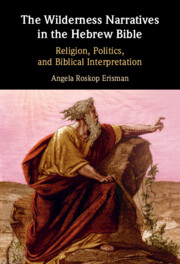
- Publisher:
- Cambridge University Press
- Online publication date:
- December 2024
- Print publication year:
- 2024
- Online ISBN:
- 9781108589826

In this volume, Angela Erisman offers a new way to think about the Pentateuch/Torah and its relationship to history. She returns to the seventeenth-century origins of modern biblical scholarship and charts a new course – not through Julius Wellhausen and the Documentary Hypothesis, but through Herrman Gunkel. Erisman reimagines his vision of a literary history grounded in communal experience as a history of responses to political threat before, during, and after the demise of Judah in 586 BCE. She explores creative transformations of genre and offers groundbreaking new readings of key episodes in the wilderness narratives. Offering new answers to old questions about the nature of the exodus, the identity of Moses, and his death in the wilderness, Erisman's study draws from literary and historical criticism. Her synthesis of approaches enables us to situate the wilderness narratives historically, and to understand how and why they continue to be meaningful for readers today.
‘In this masterful volume, Erisman demonstrates how crucial the wilderness narratives are for understanding the Pentateuch as a response to Israel and Judah's historical experience. Drawing on the best of documentary and supplementary approaches, she offers a distinctive account of the Pentateuch's development. Every page reveals fresh exegetical insights as various theoretical perspectives are combined with ease and elegance. It is not only a novel and compelling journey through the narratives of Exodus and Numbers, but a model for how to do work that is literarily sensitive and historically aware.'
Nathan MacDonald - University of Cambridge
‘The Wilderness Narratives in the Hebrew Bible is a bold, new reading of the Hebrew Bible that sees the Moses stories as political allegories with deep implications for the way we structure our communities today. This book has the potential to change the way scholars read the formative stories of the Hebrew Bible, and it breaks new paths for biblical interpretation, political thought, and theological method.'
Charles Halton - Grawemeyer Award winner for A Human-Shaped God
‘The art of close reading is not dead in biblical studies. The Wilderness Narrative in the Hebrew Bible is an eye-opening interpretive journey through the part of the biblical foundre accessible and fun to read than a convation story that stretches from the plagues of Egypt to the borders of the land of Canaan. For readers new to biblical studies, it offers a crystal clear and consistently engaging entry into the Exodus and wilderness story that is far moentional biblical commentary. However, it also has much to offer students and scholars seeking fresh insights into the biblical text, such as its discussions of the role and rhetoric of emotion in the biblical account. No story is more familiar than that of the Torah, and yet the author is able to make one feel as if one is reading it for the first time.'
Steven Weitzman - University of Pennsylvania
‘Through a smart and vibrant synthesis of literary and historical methodologies, Erisman illuminates the ways in which the writers of the Hebrew Bible used the wilderness narrative to explore some of the deepest social and political challenges that beset the ancient Israelites throughout their history, and that in fact continually confront political and social communities throughout time: What is the nature of sovereignty? What are the consequences of rebellion and foreign invasion? How do politics, religion, and rhetoric intersect for good and for ill? In Erisman’s brilliant and probing analyses, the Hebrew Bible becomes a living engagement with political thinking-one that will be of deep interest to biblical scholars as well as readers interested in the intersections of literature and politics more broadly.’
Graham Hammill - author of The Mosaic Constitution: Political Theology and Imagination from Machiavelli to Milton
‘I am impressed. This is a new and groundbreaking examination of the wilderness, with new methods from the humanities. It is very reader friendly and provides new insights in a central topic of the Pentateuchal narratives. It is a must read for all scholars, students and others that are interested in the formation of the Pentateuch.’
Thomas Römer - Professor and holder of the ‘Biblical Environments’ Chair. Collège de France
 Loading metrics...
Loading metrics...
* Views captured on Cambridge Core between #date#. This data will be updated every 24 hours.
Usage data cannot currently be displayed.